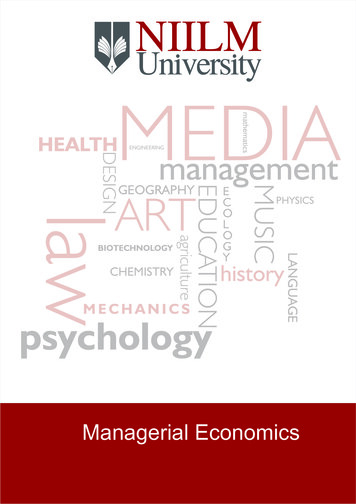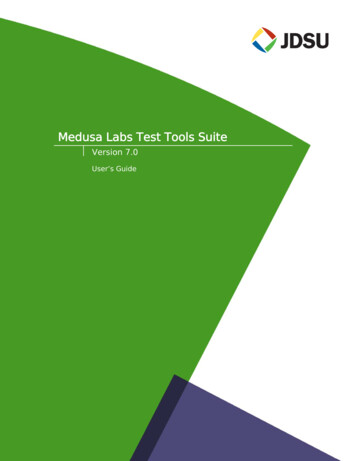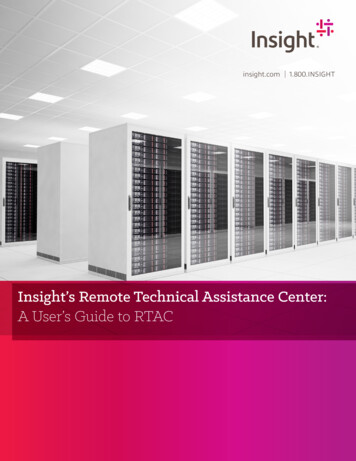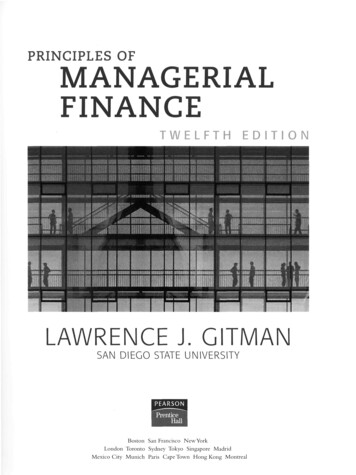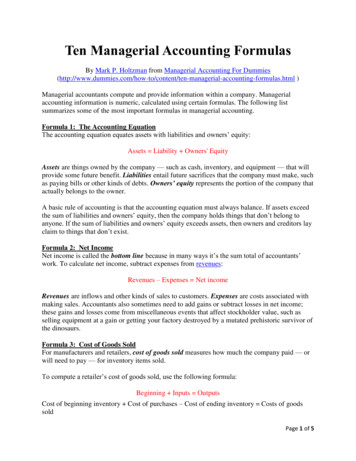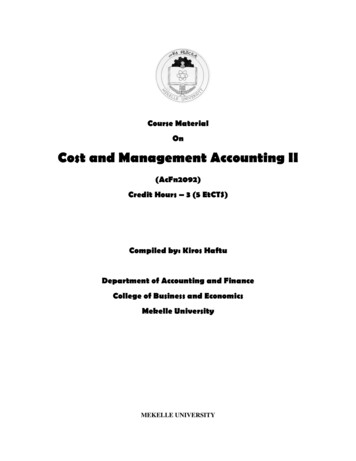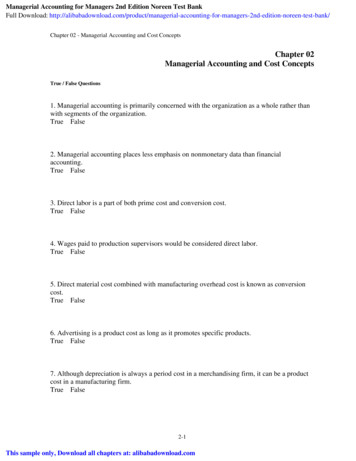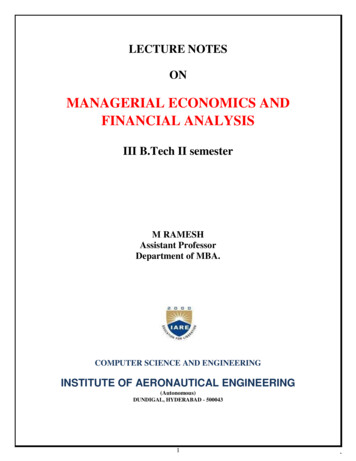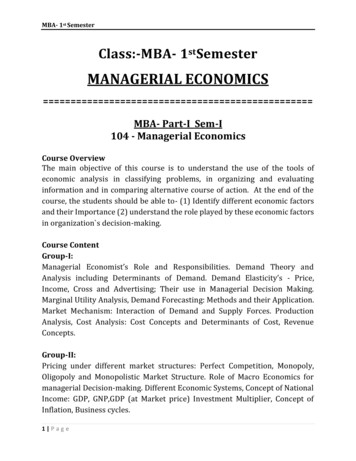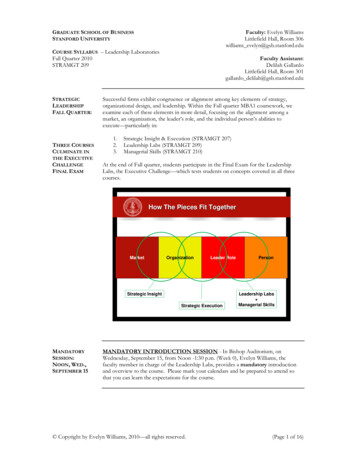
Transcription
GRADUATE SCHOOL OF BUSINESSSTANFORD UNIVERSITYFaculty: Evelyn WilliamsLittlefield Hall, Room 306williams evelyn@gsb.stanford.eduCOURSE SYLLABUS – Leadership LaboratoriesFall Quarter 2010STRAMGT 209STRATEGICLEADERSHIPFALL QUARTER:THREE COURSESCULMINATE INTHE EXECUTIVECHALLENGEFINAL EXAMFaculty Assistant:Delilah GallardoLittlefield Hall, Room 301gallardo delilah@gsb.stanford.eduSuccessful firms exhibit congruence or alignment among key elements of strategy,organizational design, and leadership. Within the Fall quarter MBA1 coursework, weexamine each of these elements in more detail, focusing on the alignment among amarket, an organization, the leader’s role, and the individual person’s abilities toexecute—particularly in:1.2.3.Strategic Insight & Execution (STRAMGT 207)Leadership Labs (STRAMGT 209)Managerial Skills (STRAMGT 210)At the end of Fall quarter, students participate in the Final Exam for the LeadershipLabs, the Executive Challenge—which tests students on concepts covered in all threecourses.How The Pieces Fit TogetherMarketOrganizationLeader RoleStrategic InsightStrategic ExecutionMANDATORYSESSION:NOON, WED.,SEPTEMBER 15PersonLeadership Labs Managerial SkillsMANDATORY INTRODUCTION SESSION - In Bishop Auditorium, onWednesday, September 15, from Noon -1:30 p.m. (Week 0), Evelyn Williams, thefaculty member in charge of the Leadership Labs, provides a mandatory introductionand overview to the course. Please mark your calendars and be prepared to attend sothat you can learn the expectations for the course. Copyright by Evelyn Williams, 2010—all rights reserved.(Page 1 of 16)
LEADERSHIPLABS:COURSEOVERVIEWHaving the opportunity to choose one’s colleagues is rare in corporate life - we usuallyinherit them when we join an organization. More often than not, when we assume amanagement position in an organization, we inherit our subordinates as well. How do we assess people and maximize the performance of the teams webecome part of, whether as members or managers?What interpersonal skills give us influence?Which interpersonal strengths can propel us to our next promotion?What development areas might prevent our ascension to the executive suite?In the Leadership Labs, we focus on these questions. However, rather than tackle caseswhere you can distance yourself in comfortable analytical discussions, we throw youinto experiential exercises, testing your ability to build effective relationships,motivate others, and influence outcomes. These Leadership Labs are not aspectator sport. You will be asked to further your leadership and interpersonal skills inevery Lab.Together in the Leadership Labs, we create a feedback intensive environment whereyou continually evaluate your own behavior, reflect on it, and choose better ways tointeract. As with many things in life, what you get out of these experiences will dependon what you put into them.YOU have to choose to engage and get involved, to ask yourself tough questions aboutyour behavior, to experiment with new approaches, and to push yourself to find newbehaviors that suit your own unique brand of leadership. The Leadership Labs providethe playing field for you to do just that; the more you get out on the field and play, themore you will get out of the Labs.LEADERSHIPLABSSTRUCTURE:FACILITATED BYLEADERSHIPFELLOWSLEADERSHIPCOACHES ANDFACULTYOVERSIGHTThe Leadership Labs total six, three-hour sessions comprised of short lectures andincreasingly challenging simulations and role-plays.Each section of 64 first-year students is facilitated by eight Arbuckle LeadershipFellows. The Leadership Fellows are second-year GSB students who have participatedin a rigorous training program that prepares them to facilitate the exercises and casesused in the Labs. Each section of 64 first-year students is divided further into smallerstudy groups of eight, called Squads, and each Squad is assigned a specific LeadershipFellow. Your Fellow will work with your Squad through most of the quarter to providecontinuity of feedback and development.Leadership Fellows facilitate all six Leadership Laboratories. Working closely with theLeadership Fellows behind the scenes are Leadership Coaches and Faculty. LeadershipCoaches are professional executive coaches who work in the Center for LeadershipDevelopment and Research (CLDR) and serve as Master Coaches for the FellowsProgram, the Leadership Laboratories, and several other organizational behaviorcourses at Stanford. You will see Leadership Coaches in all the Labs throughout thequarter.The faculty member overseeing the Fellows Program, the Leadership Labs, and theExecutive Challenge is Evelyn Williams. Her office hours during Fall quarter are byappointment. Copyright by Evelyn Williams, 2010—all rights reserved.(Page 2 of 16)
REQUIREDREADINGRequired reading for this course includes:1.2.3.Cases in your course reader packet and articles listed as required reading.Special Case versions as distributed via email from your Fellows or directlyfrom Faculty. These will be clearly marked as Leadership Lab pre-work.Assigned cases delivered the day of the Final Exam.OPTIONALREADINGYour course reader includes optional articles on leadership topics. These are meant tohelp you start a management and leadership library—a library to help with your owndevelopment and to share with future colleagues and subordinates. These readings willbe clearly marked as optional.MINIMUMSTANDARDSWe expect students to meet the following minimum standards in order to pass thiscourse: Attend all six Leadership Lab sessions. (Further details on theAttendance Policy are shown below.)Complete the Midterm Peer Feedback Assignment.Complete the Final Development Paper Assignment.Attend and participate in the Final Exam, the Executive Challenge.Earn at least 75 overall points from the table below:Grade Component360 Preparation AssignmentMax.Points6Weekly AttendanceWeekly Preparation & Participation1230Weekly Lab Feedback Survey12Midterm Peer FeedbackAssignment*20Final Development Paper*10Final Exam (ExecutiveChallenge)*Total Maximum Points:10Notes6 points for timely completion.No partial or late credit.2 points per lab.0 or 5 points per Lab, as assessed byyour Leadership Fellow. (Absent orDidn’t Meet Expectations 0, MeetsExpectations 5)2 points for timely completion ofeach feedback survey. No partial orlate credit.From 0 to 20 points. (15 points Meets Expectations; 20 points Exceeds Expectations.) Full creditrequires timely completion.From 0 to 10 points. Full creditrequires timely completion.10 points for attendance andparticipation. No partial credit.100* Note: Assignments listed above in bold must be completed in order to pass the class. Copyright by Evelyn Williams, 2010—all rights reserved.(Page 3 of 16)
ATTENDANCEPOLICYBecause the Leadership Labs are experiential, attendance is mandatory. Excusedabsences will be made only for illness, documented medical emergencies or death in theimmediate family.Due to the structure of the various exercises, you must attend the Labs during yourassigned section time. You may not switch sections.Students should notify their assigned Leadership Fellow at least 24 hours in advance oftheir intended absence.If you are more than twenty minutes late for a Lab, you will be considered absent fromthat specific Lab. If you leave class early, you may not miss more than twenty minutesor you will be considered absent from the class.PREPARATIONANDPARTICIPATIONLAB CASES &SIMULATIONASSIGNMENTSIn a case or lecture-based course, if you do not come fully prepared to participate in thediscussion, it affects only your grade. If you fail to prepare or participate actively in theLeadership Lab course, it not only impacts your grade but also directly impacts thelearning of your entire Squad. As a result, grading for the Interpersonal Skills Labs willconsider both your participation and preparation.In the Labs we create a feedback-intensive environment where you will learn about theimpact of your behavior – both what works and what you can improve. This feedbackcomes not just from your Leadership Fellow, but also from observers with experiencein every industry you can imagine – your classmates! The first-year class represents abreadth of collective management and business experience, and we will capitalize onthis experience by having you observe and coach each other in every Lab case andsimulation.To maximize your opportunities to both give and receive feedback in every Lab, youare assigned various roles to play in each case: main character, observer, orcoach. Some of you will also have the opportunity to work alongside your Fellow as aspecial supporting character, known as a protagonist, to increase the challenge of eachsimulation. More details on these supporting character roles are explained in class.LAB ACTIVITIES & ASSIGNMENTSLEADERSHIPLABSREQUIREMENTSIn addition to preparing for and participating in the weekly Leadership InterpersonalSkills Labs, there are a number of other activities and assignments designed to supportyour learning. These activities and assignments are listed below and described in moredetail in the subsequent sections below: 360 Preparation AssignmentWeekly Squad MeetingsWeekly Lab Feedback SurveyLearning GoalsOne-On-One Meeting With Your Leadership FellowFinal Exam – Executive ChallengeMidterm Peer Feedback SurveyFinal Development Paper Copyright by Evelyn Williams, 2010—all rights reserved.(Page 4 of 16)
360 ASSESSMENTPREPARATIONASSIGNMENTTo augment the feedback provided on leadership traits by your peers, Leadership Fellows,and coaches, you were required to complete a 360 assessment instrument over the summer.This assessment was emailed to you as part of the preparation assignments and should havebeen completed before arriving at the GSB. The 360 assessment results are confidential and onlyLeadership Fellows, faculty (including CAT faculty) Leadership Coaches, and administrators will haveaccess to a student’s results. Your course grade is based solely on the completion of thisassessment instrument– your grade is not influenced by the specific assessment results.WEEKLY SQUADMEETINGSYou are assigned to a Squad of six to eight first-year MBA students for the LeadershipLabs. This Squad, together with your assigned Squad Leadership Fellow, meets on aweekly basis throughout the Leadership Labs (for a total of six Squad meetings). TheLabs are fast-paced and can be an intense experience. The weekly Squad meeting is anopportunity to reflect on the Lab experience and to transform it into your own uniquepractical applications that last. As with the Labs, you get out of your Squad meetingswhat you put into them. Many students find that their Squad becomes "home base", aplace where they find both support and challenge as they adjust to life at the GSB andset meaningful goals for their growth and development as leaders.SchedulingYou need to schedule your weekly Squad meeting with your assigned Squad LeadershipFellow and Squad members during the first week of the Labs.Meeting Your Squad—Kickoff on 9/20 or 9/21 from 7-9 p.m.Initially, your Leadership Fellow will contact you right before Week One to schedule aninformal Squad get-together so that you can plan out your quarter and get to know eachof your Squad mates in a more casual setting before the Labs begin. Please keep bothof these dates/times available until you have confirmed a time with your SquadLeadership Fellow.WEEKLY LABFEEDBACKSURVEYAfter each Interpersonal Skills Lab you must complete a Lab Feedback Survey in theGSB’s Feedback system. You can access these surveys through our class site onCoursework (https://coursework.stanford.edu/portal) or by going directly to theFeedback system at https://gsbapps.stanford.edu/feedback. In each survey you willprovide feedback on the content of the Lab and the effectiveness of the Lab presenters.In Weeks 3 and 7, you will also be asked to complete an additional set of questions toprovide feedback on your Squad Fellow’s effectiveness; these questions will be in aseparate, second survey.The feedback from these surveys provides: Continuous improvement of the Lab content and experience for your classand future classes at the GSB. Development for the Fellows in their roles as lab presenters and SquadFellows. Grading data for the Leadership Fellows. (Your feedback is one of multipleinputs for their grades.) Data for ongoing research conducted by the Center for LeadershipDevelopment & Research.Due DatesThese surveys are due by 1:00 p.m. on the Thursday after each Interpersonal Skills Lab.Please note that these surveys should take less than 10 minutes to complete and that thesystem will close promptly at 1:00 p.m.GradingYou are graded on timely completion of each Weekly Lab Feedback Survey. There isno partial or late credit. Copyright by Evelyn Williams, 2010—all rights reserved.(Page 5 of 16)
LEARNING GOALSResearch shows that having clear and specific learning goals significantly increases thelevel of learning in experiential activities. In Week 1 you will see yourself on video in agroup setting and also receive your 360 Degree Feedback results. You will use theseinputs as data to prepare a draft of your learning goals, which you will discuss with yourSquad mates in your Week 1 Squad meeting. (Refer to Learning Goals handout in CourseReader). After this Squad meeting you will finalize your learning goals and email themto your Squad Fellow, who will circulate every team member’s goals to the entire group.Having clear goals will help you focus your efforts in the Lab; and sharing these goalswith your Squad mates and Squad Fellow will provide you a support system forfeedback and challenge in pursuing your goals. Having clear goals will also facilitate thewriting of your Development Paper at the end of the quarter.Due DateE-mail your learning goals to your Squad Fellow by 1:00 p.m. on Tuesday, September28.ONE-ON-ONEREFLECTIONMEETING WITHYOUR SQUADFELLOWYou have a One-On-One Reflection meeting with your Squad Fellow during Week 6 or 7(midterm week).This 45-minute meeting provides you with an opportunity to: Get feedback and coaching about your progress in the Labs.Think through your development goals.Make sense of the feedback you have received from your peers as well as in your360 Degree Feedback instrument.Think through your Development Paper.Think about how you want to use your remaining time at the GSB to furtherdevelop your leadership skills.SchedulingIt is your responsibility to schedule this meeting with your Squad Fellow.FINAL EXAM:EXECUTIVECHALLENGEDECEMBER 18 A.M. – 7 P.M.The Final Exam for this course is a day-long simulation conducted on Wednesday,December 1st. Prominent GSB alumni come to campus to help simulate ―A Day in the Lifeof a Leader.‖ Each Squad receives a set of cases that morning which they role-play withseveral alumni in front of a panel of alumni judges. Alumni judges and faculty providefeedback on students’ abilities to build effective teams, motivate others, develop productiverelationships, and influence outcomes. This is a competitive event between Squads. Copyright by Evelyn Williams, 2010—all rights reserved.(Page 6 of 16)
MIDTERM PEER FEEDBACK & FINAL DEVELOPMENT PAPER ASSIGNMENTSOVERVIEWIn the Leadership Laboratory classes we provide students with opportunities to create,experience, reflect, and transform together. The Midterm Peer Feedback & FinalDevelopment Paper assignments are significant milestones for reflection upon whatyou have observed, analyzed, and learned about yourself, your squad mates, and yourLeadership Fellows over the course of our few weeks together.The Midterm provides our ―midpoint correction‖ opportunity to assess where we’vebeen and what we’d like to accomplish in our remaining Labs together and beyond.The Development Paper provides an opportunity for you to synthesize all of thefeedback you have received, to incorporate conceptual knowledge learned in the Labs,and to decide how you will apply this learning going forward. The Development Paperassignment includes three components:DEADLINES:- PEER FEEDBACK:OCTOBER 22- FINALDEVELOPMENTPAPER:DECEMBER 61.2.3.Insight & Reflection AssessmentAction PlanLeadership Fellows & Faculty Feedback1.The deadline for submitting your Peer Feedback Survey is 1:00 p.m., FridayOctober 22, 2010.2.The deadline for submitting all three components of your Development Paperis 1:00 p.m., Monday, December 6, 2010, which is the first day of FinalsWeek.In order to pass the Leadership Laboratory Course, you must submit the Peer FeedbackSurvey and the Final Development Paper.NOT ANONYMOUS!The feedback you provide to your peers is NOT anonymous, nor is the feedback youprovide to your Leadership Fellow.MIDTERM PEERFEEDBACKSURVEY OPENSSEPTEMBER 22Below are details for the Midterm Peer Feedback Survey assignment: Opening & Closing Dates: The Peer Feedback Survey will open at 1:00p.m. on Wednesday, September 22, 2010 and will close at 1:00 p.m., FridayOctober 22, 2010.No full-credit for LATE Peer Feedback: Once this survey closes,assignments which are incomplete or late may receive no more than amaximum of 10 points. The Midterm Peer Feedback Assignment is gradedon timely submission and additional points may be given for particularlyinsightful IMPACT feedback.Access through CourseWork: You can access the Peer Feedback Survey onour Coursework Site: https://coursework.stanford.edu/portal and click onthe tabs for STRAMGT 209. Or you can go directly to the GSB FeedbackSystem via the following link: https://gsbapps.stanford.edu/feedbackComplete Assessments on all your Squad Mates: You must providefeedback to each of your seven squad mates by completing the survey for eachstudent.Provide Balanced Feedback: The survey requires you to providebalanced feedback by noting at least one positive and one area fordevelopment for task, process, and relational behaviors that you haveobserved in each of your squad mates. (So start taking notes now at thebeginning of the quarter!) To that end, you may be explicit about how tointerpret your feedback. For example:o You can note the part(s) of your feedback that are most significant (e.g.,―This is the most crucial feedback I’m giving you – if you adapt in this Copyright by Evelyn Williams, 2010—all rights reserved.(Page 7 of 16)
area I think you will be dramatically more effective.‖)You can say that a particular plus or delta is less significant (e.g., ―You areso skilled in the Relational area that it’s hard for me to offer a significantdelta. However, one small way you might improve your effectiveness is ‖)Plan for 30 minutes per squad mate to complete this writtenassignment: Each individual feedback assessment of your squad mates takesapproximately 30 minutes to complete. Plan in advance to spread thiswork out over the quarter. You can enter your observations directly into thePeer Feedback Survey on an ongoing basis or take notes separately and enterthem into the survey later.Reading your Individual Feedback: After the survey closes at 1:00 p.m.,Friday October 22, 2010 you will be able to review the feedback given to youby your peers.Troubleshooting: This online tool is relatively new at the GSB, so if youencounter difficulties please contact the Instructional Technology Group atinstructional technology@gsb.stanford.edu.o FINALDEVELOPMENTPAPERCOMPONENT 1:INSIGHT &REFLECTIONASSESSMENTAs you near the end of your first quarter at the GSB we'd like you to take a moment tostep back and reflect on what you have learned about yourself, not just in theLeadership Labs, but in your other classes, your study groups, and your interactionswith classmates, faculty and other members of the GSB community. Your peerfeedback and your midterm reflection meeting with your Squad Fellow are just two ofmany sources of input for you to reflect on. This section of the paper should be ananalysis and synthesis of what you have learned about yourself since you arrived at theGSB, both your strengths as well as your areas for development.This section should be double-spaced and at least two pages but no longer than fourpages. You may use paragraphs or bullet points at your discretion.IMPORTANT: Please include a cover page with your name, student I.D. number,section number, squad number, the name of your Leadership Fellow, and thedate. Due to the high volume of papers that are submitted, incorrectly labeledpapers may not receive full credit.FINALDEVELOPMENTPAPERCOMPONENT 2:ACTION PLANThe Action Plan provides an executive summary of your plans and goals for yourremaining five quarters at the GSB. What specific skills do you hope to continuestrengthening and what skills do you need to acquire that you may not yet have? Howdo you plan to enhance these skills or behaviors in the future through GSB courses orother aspects of your GSB experience? How will you measure progress and determinewhether successful change has occurred?This section should be double-spaced and at least two pages but no longer than fourpages. You may use paragraphs or bullet points at your discretion. Please attach yourAction Plan to your Insight & Reflection Assessment.FINALDEVELOPMENTPAPERCOMPONENT 3:LEADERSHIPFELLOWS &PROGRAMFEEDBACKWe are focused as a team of Leadership Fellows, Leadership Coaches, and faculty onensuring that we provide a challenging, constructive, and relevant leadership learningexperience for you and your Leadership Lab peers. To help us continue to create ameaningful lab experience, please take a few moments to write down what you’veenjoyed and any suggestions you might have for improvements.There is no required minimum or maximum limit on this section—one paragraph isfine. Please attach your feedback to your Insight & Reflection Assessment and ActionPlan. Copyright by Evelyn Williams, 2010—all rights reserved.(Page 8 of 16)
FINALDEVELOPMENTPAPER DEADLINES& CREDITThe deadline for submitting all three components of your Final Development Paper is1:00 p.m., Monday, December 6, 2010. The Final Development Paper is graded ontimely submission. Any incomplete or partial submission can receive no more thanpartial credit of 5 points.DUE 1:00 P.M.MONDAY,DECEMBER 6IMPORTANT: You must drop off a copy of your paper in Lockbox #13 ANDemail a copy to your Fellow. Again, please include a cover page with yourname, student I.D. number, section number, squad number, the name of yourLeadership Fellow, and the date. Due to the high volume of papers that aresubmitted, incorrectly labeled papers may not receive full credit.CONFIDENTIALITYPOLICYConfidentiality is critical to the success of the students involved in the Leadership Labs. Tocreate a safe environment in which risk taking and trying new behaviors are supported, thefollowing is expected of both Students and Fellows as they work together: No student is to discuss, outside of their Squad, any details of what othermembers of the Squad say and do in the exercises and discussions.Videos are to be used for personal learning, and are not to be shared with anyoneoutside the Squad. Any misuse of these videos could be construed as aviolation of the Fundamental Standard.In pursuit of maximizing student learning, Fellows may discuss development goalsand behavioral observations of MBA1s with other Fellows (and LeadershipCoaches) and provide feedback they get from others directly to students as part ofthe developmental process.If a student shares information of a personal nature with his/her Fellow, thatinformation will not be shared (with other students, Fellows, Faculty, orLeadership Coaches) unless the student gives her/his express permission to do so.However, if a student is in a situation in which they may inflict harm tothemselves or to others, the Fellow has a responsibility to share this informationwith the appropriate GSB Student Life staff. The Fellow/student relationship isnot a legally privileged one. Copyright by Evelyn Williams, 2010—all rights reserved.(Page 9 of 16)
CONSENT FOR PARTICIPATING IN RESEARCHDESCRIPTIONMany of the learning points in this course have been developed and refined throughextensive prior MBA classroom experiences. Just as prior students have made thiscourse possible by sharing their experiences in research studies, you have theopportunity to contribute to the education of future students by sharing your ownexperiences for the purpose of research.RISKS ANDBENEFITSThe risks associated with your participation in this research are minimal. If you consentto allow your responses (including the exercises and data from other course exercises,as well as surveys by the CMC and other school offices) to be used for researchpurposes and for future refinement of course materials, your information will be keptstrictly confidential. Any information derived from this research that would identifyyou would not be voluntarily released or disclosed without separate consent.PAYMENTSYou will receive no payment for your participation in this research.SUBJECT’SRIGHTSYour participation is voluntary and you may withhold your materials from researchpurposes at any time without an effect on your course grade. If you have questionsabout your rights as a research participant, you may contact the Stanford UniversityHuman Subjects Committee Administrator at (650) 724-7141.QUESTIONS?For questions about the study, please contact:Faculty: Evelyn WilliamsLittlefield 306Telephone: 650.736.9875Protocol Approval Date: 11/17/06 Copyright by Evelyn Williams, 2010—all rights reserved.(Page 10 of 16)
WEEKLY ASSIGNMENTSWEEK 0:Required Introductory Session to the Leadership Lab Course, STRAMGT 209.OVERVIEW:STRAMGT 209When: Wednesday, September 15th, Noon.Where: Bishop AuditoriumWhy: Learn expectations for the entire Leadership Lab Course, meet the Faculty, &Leadership Coaches you will work with throughout the quarter.SEPTEMBER 15THWEEK 1:SQUAD KICKOFFMEETINGSEPTEMBER 20THOR 21STAWARENESS LABSEPTEMBER 22NDSquad Kickoff Meeting 9/20 or 9/21:Your Squad Fellow will contact you to schedule an informal meeting of the Squad on theMonday or Tuesday evening of week 1 so that you will have a chance to get to know eachother before the first Lab. Please keep both of these dates/times available until you haveconfirmed a time with your Squad Fellow.Awareness Lab:An intense experiential activity, this 3.5 hour Lab gives students first-hand awareness oftheir approach to team dynamics. Students are given a challenging task to complete as ateam, and are videotaped as they work on the project. This is followed by a videotapereview, where each student analyzes the group dynamics and his/her own contribution tothe team’s performance. Students then exchange 1:1 feedback with a fellow teammember, deepening and reinforcing the learning. Students gain a very clear picture oftheir strengths and areas for development within a group context.Before the Lab: ―Becoming Self Aware,‖ True North: Discover Your Authentic Leadership, BillGeorge with Peter Sims. ―Fear of Feedback,‖ Harvard Business Review, Jay M. Jackman and Myra H.Strober.After the Lab: Weekly Feedback Survey: due by 1:00 p.m., Thursday, September 23. Accessvia the GSB Feedback System: https://gsbapps.stanford.edu/feedback Learning Goals: Prepare a draft of your learning goals (refer to Learning Goalshandout in Course Reader) for discussion with your Squad mates in your Week 1Squad meeting. Weekly Squad Meeting: Scheduled by your Squad Fellow your Squadmates. Watch your Squad videos each week-- you can continually accelerate yourlearning and self-improvement by watching yourself from an outsideperspective. So it’s a good weekly habit to review your videos before your SquadDevelopment meeting, and to take notes on your behaviors as well as yourSquadmates’. These notes will prove very useful in helping you complete your PeerFeedback assignment and your Final Development Paper at the end of thecourse. Access your videos on the T: drive in the 'Leadership Lab Videos'folder—look for your Fellow’s name for your Squad folder.Notes:1. While you have already reviewed the Awareness Lab video as part of the labitself, this will not be the case in future weeks.2. If you are trying to watch your videos on your personal computer and thesound or video is not working, you may need to download a small piece ofsoftware (called a codec) that will allow your computer to play these filescorrectly. This software is available at https://www.xvid.org.(CONTINUED ON NEXT PAGE) Copyright by Evelyn Williams, 2010—all rights reserved.(Page 11 of 16)
WEEK 1:AWARENESS LAB(CONTINUED)After the Lab (CONTINUED): Protagonist Training— two people in each Squad will receive an email thisweek asking them to attend an ―EAS Protagonist Meeting‖ after nextweek’s Lab in preparation for the Executive Action Skills Lab. The Meeting ison Sept. 29th from 11:45 a.m.-12:45 p.m. Protagonists play special roles in thecases along with your Fellows. Over the course of the quarter many of youwill be asked to play a Protagonist role at some point for various cases.After the Squad Meeting: Learning Goals: E-mail your finalized learning goals to your Squad Fellowby 1:00 p.m., Tuesday, September 28.WEEK 2:Maximizing Team Effectiveness (MTE) Lab:MAXIMIZINGTEAMEFFECTIVENESSLABThe MTE Lab focuses on improving students’ behavioral analysis skills within teamsettings. It provides the framework for analyzing group process and team dynamicsspecifically addressing how to move through conflict to become a high performingteam. Students gain useful tools to diagnose where conflict and/or blind spots mayoccur and in general develop useful strategies for improving their study group andother team experiences—particularly focusing on process issues that can stymie theirproductivity.SEPTEMBER 29THBefore the Lab: Fine Wine Case—please read the basic background of the case provided inyour course reader. During this Lab, you participate in a negotiation bet
Program, the Leadership Laboratories, and several other organizational behavior courses at Stanford. You will see Leadership Coaches in all the Labs throughout the quarter. The faculty member overseeing the Fellows Program, the Leadership Labs, and the Executive Challenge is Evelyn Williams. Her office hours during Fall quarter are by appointment.
